Lauren Rudd
Zoologist
Hi everyone, I’m Lauren. I work in animal behaviour and conservation, studying lions! I am currently completing a PhD in the Department of Biology at the University of Oxford.
My story
My dad’s family are British, and my mum’s family are from Punjab, India, but immigrated to England after World War II and partition. I was born in Slough but moved to the Scottish Borders when I was 5, which was a huge change for me. While I found it hard to adjust to being in a place that was less diverse and was far away from my friends and family, I loved that my new home was surrounded by nature and green spaces.
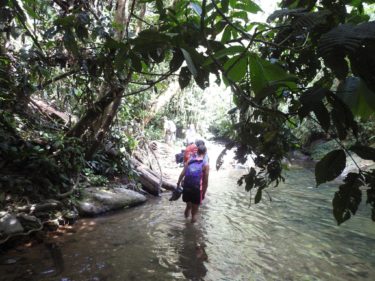
Hiking through a rainforest in northern Sumatra, during a week off from boat-based research around Indonesia
Every day on my walk to school I went through woodlands where I saw animals and plants, and I became fascinated with understanding more about the world around me. I watched lots of nature documentaries and became particularly interested in species like elephants and dolphins, that were social and lived in big groups. I was fascinated by the way that they communicated with each other and depended on the group for things like finding food and looking after their young.
In school Biology was my favourite subject and one of my biology teachers suggested I apply to university to study it further. No one in my family had been to university before so I was not sure how to apply but was lucky to get a lot of support from my teachers. I did a Zoology degree at the University of Edinburgh and spent a year studying abroad in Australia which was a dream come true. I got to visit rainforests, coral reefs, and deserts, and do a lot of exciting fieldwork like studying kangaroo behaviour and fish conservation on the great barrier reef!
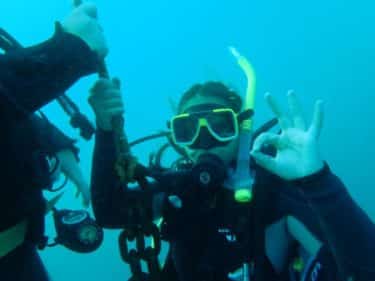
The end of my SCUBA qualification dive off the coast of Brisbane, which opened the door to lots of research!
I loved the style of teaching in Australia, which was more focused on hands-on learning out in the field rather than studying from textbooks. This convinced me that I wanted to do more animal research, so when I finished my degree, I spent some time working with sharks and rays in Indonesia, before applying to do a PhD at the University of Oxford.
I didn’t “dream” of being a Biologist when I was younger because I didn’t know it was a job I could have, and I didn’t know what it would involve doing. What I did know was that I craved being active and outside, I loved nature, I wanted to understand why animals behaved the way they did, and I dreamed of travelling. Luckily my research has allowed me to do all those things and more!
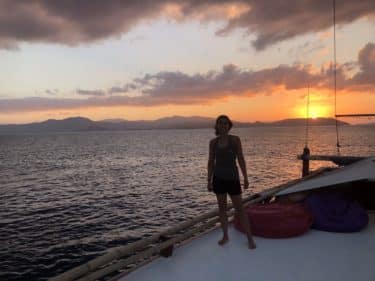
The boat I stayed on while doing shark and ray surveys in Komodo Marine Park, Indonesia
I’ve also had the opportunity to get involved in other things I enjoy at university, such as playing basketball and doing equality and diversity work. In 2020, some friends and I set up the BIPOC STEM Network to support researchers at the University of Oxford who are people of colour. Alongside this I have done lots of work to advocate for people who work in science but are not what we would imagine as the “typical” scientist – such as people of colour, LGBTQ+ people, and disabled people. I think this work is even more important than my research, as I hope to help make science more accessible for everyone, regardless of their identity and background.
My research
When I was applying for my PhD, I decided that I wanted to focus my research on both animal behaviour and conservation (which is about protecting the environment and the plants and animals that live in it). I was offered a place at the University of Oxford and the chance to work at the Wildlife Conservation Research Unit (WildCRU) where I now study lions. This is especially exciting given lions have been one of my favourite animals ever since I first saw The Lion King as a child!
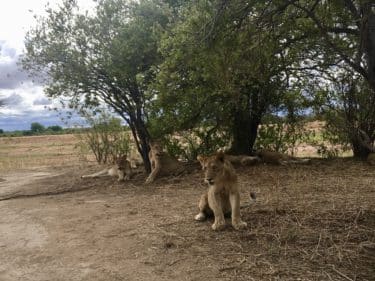
Lions in Ruaha National Park, Tanzania. Part of my PhD fieldwork
The number of wild lions is declining quickly due to the threats such as habitat loss, climate change and conflict with people. Another threat that lions sometimes face is exposure to diseases that can kill them. This is particularly a problem for small populations of lions, because with fewer individuals to begin with, it is more likely that a disease could kill them all. For a social species like lions, it is also possible for a disease to kill so many individuals that they can no longer carry out the behaviours that they usually do in groups (such as hunting and raising cubs) which makes it difficult for them to survive even if they don’t get sick.
I am researching outbreaks of canine distemper virus (CDV) in lion populations in Tanzania. The worst outbreak of CDV in these areas caused over 30% of the population to die. During the time when the disease was widespread, lions spent less time interacting with each other and their territories shrank in size. You can think of this a little bit like how people reacted to COVID-19 by “social distancing”!
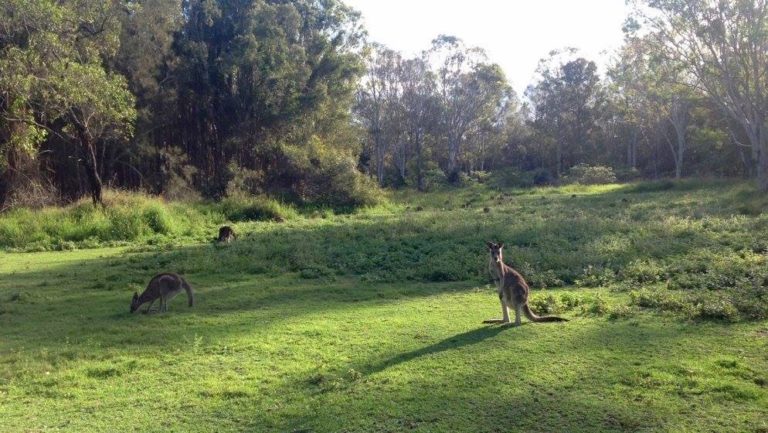
Kangaroos in a park along the Gold Coast, Australia! An undergraduate research project looking at how vigilance behaviour was impacted by levels of human activity across different areas of the park
I’m trying to understand why lions changed their behaviour this way (for example, were they avoiding catching CDV from others?), how they changed their behaviour (for example, did they spend more time alone, or maybe pick only one “friend” to interact with?) and finally whether these behaviour changes were different between individuals based on factors like their sex and age (for example, did young lions behave similarly to each other, but differently than adults). I also want to know how lions responded to the death of their pride mates, and how long it took them to return to their normal social behaviour after the disease was gone.
My research will help us to understand more about how disease impacts the social behaviour of lions. This is important because lion social behaviour influences lots of significant things such as their feeding and breeding behaviour, which are essential for population survival. In addition, understanding how lion populations respond to individuals dying from disease allows us to predict how they will respond to individuals dying because of other threats, such as habitat loss, climate change and conflict with people. This is important to understand if we want to protect lions for the future!
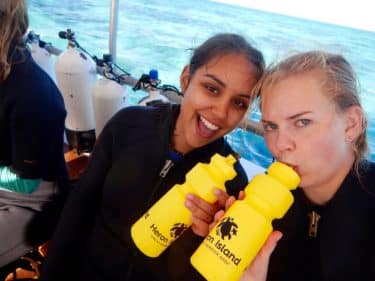
Heading back from diving off Heron Island, Australia. This trip was part of an undergraduate field course and we were monitoring fish feeding behaviour across different areas of the coral reef


